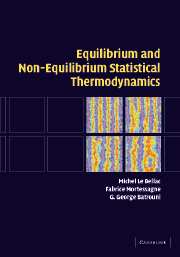Book contents
- Frontmatter
- Contents
- Preface
- 1 Thermostatics
- 2 Statistical entropy and Boltzmann distribution
- 3 Canonical and grand canonical ensembles: applications
- 4 Critical phenomena
- 5 Quantum statistics
- 6 Irreversible processes: macroscopic theory
- 7 Numerical simulations
- 8 Irreversible processes: kinetic theory
- 9 Topics in non-equilibrium statistical mechanics
- Appendix
- References
- Index
7 - Numerical simulations
Published online by Cambridge University Press: 03 December 2009
- Frontmatter
- Contents
- Preface
- 1 Thermostatics
- 2 Statistical entropy and Boltzmann distribution
- 3 Canonical and grand canonical ensembles: applications
- 4 Critical phenomena
- 5 Quantum statistics
- 6 Irreversible processes: macroscopic theory
- 7 Numerical simulations
- 8 Irreversible processes: kinetic theory
- 9 Topics in non-equilibrium statistical mechanics
- Appendix
- References
- Index
Summary
As we have seen on several occasions, a great many of the physical phenomena of interest concern collective behaviour or strongly correlated particles. While it is sometimes possible to obtain useful insight using approximation methods, such as perturbation theory, reliable controlled approximations do not exist. In such situations, numerical simulations have become an indispensable tool.
We shall not attempt in this chapter to discuss computer programming nor shall we discuss many of the powerful methods, both algorithmic and in data analysis, that have been developed since numerical simulations have become an important research tool. Instead, we shall assume that the reader already has enough familiarity with computer programming to apply the notions which we discuss here. Our goal is to explain enough of the basics of the Monte Carlo method (classical and quantum) to allow the reader to apply it readily to interesting equilibrium statistical physics problems of the type discussed in this book. The problems in this chapter have been tailored with this in mind. The programs needed are relatively simple and the physics illustrates many of the phenomena already seen: phase transitions with and without spontaneous symmetry breaking, critical exponents, diverging susceptibilities, scaling, vortices, superfluids etc. Consequently, some of the problems are somewhat long and may be better considered as mini-projects.
Markov chains, convergence and detailed balance
Even relatively innocent looking models are impossible to solve exactly. The exact solution of the two-dimensional Ising model is known but not in the presence of an external magnetic field. In three dimensions, even in the absence of a magnetic field, the exact solution is not known. In fact, relatively few models can be solved exactly; see Reference [14] for an excellent review of the subject.
- Type
- Chapter
- Information
- Equilibrium and Non-Equilibrium Statistical Thermodynamics , pp. 375 - 442Publisher: Cambridge University PressPrint publication year: 2004



